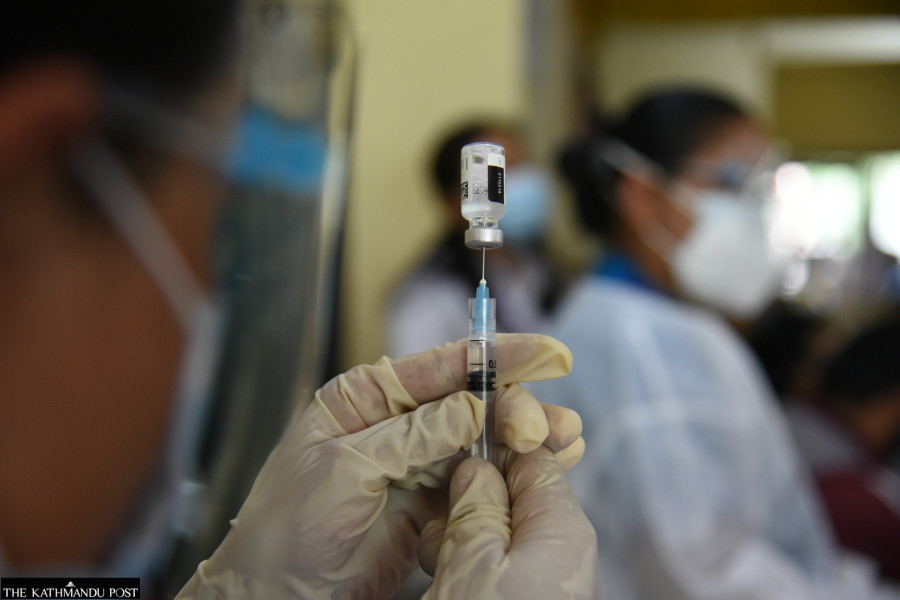Health
Booster jabs, masking advised as new Covid wave looms
Health Ministry expects a surge in coronavirus cases somewhere between January-end and second week of February.
Arjun Poudel
On Thursday, a 24-year-old migrant worker from Sainamaina Municipality of Rupandehi district who was returning from the United Arab Emirates, tested positive for the coronavirus.
Staffers at the airport health desk had carried out an antigen test upon his arrival, as the man had Covid-19-like symptoms.
“We called an ambulance to the runway and sent the patient directly to Sukraraj Tropical and Infectious Disease Hospital,” said Gopal Pandey, a health worker serving at the desk. “For the past couple of days, we have stepped up surveillance on those suspected of infection.”
Amid the risk of a new surge of coronavirus cases in the country, the Ministry of Health and Population has directed agencies concerned to step up surveillance measures.
Carrying out antigen testing in suspected cases is among the measures being carried out to prevent the outbreak of a new variant of Covid-19, which has wreaked havoc in China and other Asian countries such as Japan and South Korea, where Nepalis have high mobility.
But what concerns public health experts more is China’s recent move to open its borders to Nepal after two and a half years, just when the spread of coronavirus there started getting out of control.
India too has recorded a marginal rise in the total number of new cases in recent days. The country may see a surge in cases in the next 40 days, according to media reports.
Experts in Nepal said that the rise in new cases in India is a matter of concern given the uninterrupted cross-border movement between the countries.
Nepal and India share about 1,800km of porous and unregulated border from where thousands of people move across the two countries every day.
Workers deployed at health desks set up at international land crossings and international airports say that the measures being currently taken won’t stop the virus from entering the country.
According to them, antigen testing is being carried out only on symptomatic people. Passengers have to show a vaccine quick response code or negative report of polymerase chain reaction tests. Infected people can enter the country in the incubation period, when they may not be showing Covid-19 symptoms. They can pass the virus to the people who come in their close contact.
“We kept the infected person in hospital for two hours, counselled him and then sent him home,” said Nabaraj Gautam, information officer at Sukraraj Hospital. “The man boarded a taxi on the way out.”
Authorities concerned stopped regulating movements of infected persons long ago.
Infectious disease experts say that a new surge in Nepal is inevitable and it’s only a matter of time. They say preventive measures could reduce the impact of the new surge.
“I want to emphasise that the only way out is vaccine, vaccine and vaccine again,” said Dr Rajiv Shrestha, an infectious disease expert at Dhulikhel Hospital. “Administer booster shots at the earliest and strictly enforce masks and other public health measures.”
Of late, the Health Ministry has reported circulation of at least 17 different sub-variants of Omicron including BA.2, BA2.75, BA.2.75.1, BA.2.75.2, BA.2.75.3, BA.2.75.5, BA.2.75.6, BA.2.76, BA.5.2, BA.5.2.1, BM.1, BM.1.1.3, BN.1.3, BQ.1.1, BQ.1.2, By.1 and XBB in the country.
The country has yet to report the presence of the B.F.7 variant that is spreading in China and other countries but, again, experts say its entry into Nepal is inevitable.
Nepal has reported almost all variants and sub-variants of Covid-19 detected in the world. Due to the high mobility of people across the globe, the risk of any virus variant entering the country remains high, doctors say.
“Even if we do not at present have the B.F.7 virus variant, there is always the risk of its spread here, and such a risk has only heightened of late,” said Dr Sanjay Kumar Thakur, spokesperson for the Health Ministry. “We have alerted all agencies concerned.”
Nepal on Saturday reported five new Covid-19 cases out of 169 polymerase chain reaction tests carried out across the country. The number of active cases, which had declined to 10 on Monday, the lowest in the two-and-a-half years, rose to 30 on Saturday.
“We expect a new surge from January end,” said Thakur. “Only with the cooperation of all concerned agencies, as well as the general public, will we be able to check its spread. The Health Ministry cannot do everything on its own.”
So far, 12,019 Covid-related deaths have been reported in Nepal, according to the official count. The Health Ministry said that 22,324,933 people, or 76.5 percent of the total population, have been fully vaccinated. The number of people taking booster shots stands at 7,972,791 as of Saturday.




 21.52°C Kathmandu
21.52°C Kathmandu















